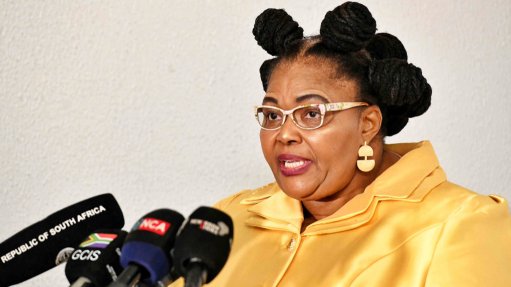South Africa still in talks with US to cut reciprocal tariffs as it prioritises ‘butterfly strategy’ to raise exports to R3tr
The Department of Trade, Industry and Competition (dtic) has again confirmed that it is continuing with its negotiations with the US in a bid to reduce the 30% reciprocal tariffs that have been imposed on many South African exports since August.
In a presentation to the parliamentary portfolio committee, deputy director-general for trade Ambassador Xolelwa Mlumbi-Peter indicated that the immediate focus was on reciprocal tariffs, with a view to then pursuing a second round of talks on country specific commitments, as well as on a specific tariff offer.
The tariff offer would affect all Southern African Customs Union (Sacu) members, and she reported that Sacu was aiming to finalise the offer with a view to “submitting it as soon as possible”.
Mlumbi-Peter stressed that the aim for South Africa was to negotiate an agreement that created a level of predictability on trade, reduced the reciprocal tariff and enabled trade to continue to flow, without compromising the country’s ability to make policies that advance national interests.
South Africa had experienced some recent relief after certain agricultural products, most notably citrus, were exempted from the reciprocal tariffs, alongside the exemptions already in place for critical minerals.
Nevertheless, the country’s exports were still affected by both the reciprocal tariffs and the Section 232 tariffs imposed on the basis that foreign imports threaten US national security, including the 25% duties being imposed on automotive and automotive components, as well as the 50% on steel, aluminium and semi-processed copper.
Mlumbi-Peter said that the automotive tariffs affected 21.8% of South Africa’s exports to the US, while the tariffs on steel and aluminium affected 13.5%.
Reciprocal tariffs affected South African exports of chemicals (6.5%) other manufacturing (4.6%), agriculture (3.4%), nonelectrical machinery (2.7%), processed food (2.4%), other transport equipment (1.9%), beverages (0.8%), and electrical machinery (0.7%), while textiles, clothing and leather, paper and plastic products were all less than 1%.
South Africa was also continuing to advocate, in parallel, for the renewal of the Africa Growth and Opportunity Act (Agoa), which expired on September 30, with Mlumbi-Peter indicating that a rollover had bipartisan support in Congress, while the White House had expressed its support for a one-year renewal.
“What is expected is a straight rollover of the current benefits to the existing members, which will mean that South Africa … will continue to benefit under the programme,” she said, indicating that Senator John Kennedy, of Louisiana, had introduced a Bill to renew Agoa for two years.
Asked whether Agoa could coexist with reciprocal tariffs, she said because the reciprocal tariffs were additional to the most favoured nation tariffs, the duty- and quota-free access provided under Agoa would offer a “margin of preference” to beneficiaries.
Trade, Industry and Competition Minister Parks Tau stressed, however, that South Africa was accelerating it strategy to diversify exports not only because of US developments, but rising protectionism and uncertainty in other markets.
Implementation was being pursued under the so-called “butterfly strategy”, where Africa represented the body and the ‘wings’ represented the rest of the world, including 27 new and emerging markets earmarked as priority markets
The strategy is anchored by the African Continental Free Trade Agreement (AfCFTA), under which 24 countries were currently trading. In 2024, R485-billion of South Africa’s R571-billion in exports to the rest of Africa took place under the terms of AfCFTA.
The strategy aims to diversify exports both geographically and by product category, with a particular focus on increasing value-added exports and leveraging trade agreements and diplomatic efforts to enhance market access.
The dtic has set a strategic target of growing the value of South African exports from about R2-trillion to R3-trillion by 2030.
In 2024, South Africa’s exports stood at R2.04-trillion, while imports were R1.7-trillion, resulting in a surplus of over R340-billion.
Article Enquiry
Email Article
Save Article
Feedback
To advertise email advertising@creamermedia.co.za or click here
Press Office
Announcements
What's On
Subscribe to improve your user experience...
Option 1 (equivalent of R125 a month):
Receive a weekly copy of Creamer Media's Engineering News & Mining Weekly magazine
(print copy for those in South Africa and e-magazine for those outside of South Africa)
Receive daily email newsletters
Access to full search results
Access archive of magazine back copies
Access to Projects in Progress
Access to ONE Research Report of your choice in PDF format
Option 2 (equivalent of R375 a month):
All benefits from Option 1
PLUS
Access to Creamer Media's Research Channel Africa for ALL Research Reports, in PDF format, on various industrial and mining sectors
including Electricity; Water; Energy Transition; Hydrogen; Roads, Rail and Ports; Coal; Gold; Platinum; Battery Metals; etc.
Already a subscriber?
Forgotten your password?
Receive weekly copy of Creamer Media's Engineering News & Mining Weekly magazine (print copy for those in South Africa and e-magazine for those outside of South Africa)
➕
Recieve daily email newsletters
➕
Access to full search results
➕
Access archive of magazine back copies
➕
Access to Projects in Progress
➕
Access to ONE Research Report of your choice in PDF format
RESEARCH CHANNEL AFRICA
R4500 (equivalent of R375 a month)
SUBSCRIBEAll benefits from Option 1
➕
Access to Creamer Media's Research Channel Africa for ALL Research Reports on various industrial and mining sectors, in PDF format, including on:
Electricity
➕
Water
➕
Energy Transition
➕
Hydrogen
➕
Roads, Rail and Ports
➕
Coal
➕
Gold
➕
Platinum
➕
Battery Metals
➕
etc.
Receive all benefits from Option 1 or Option 2 delivered to numerous people at your company
➕
Multiple User names and Passwords for simultaneous log-ins
➕
Intranet integration access to all in your organisation





















